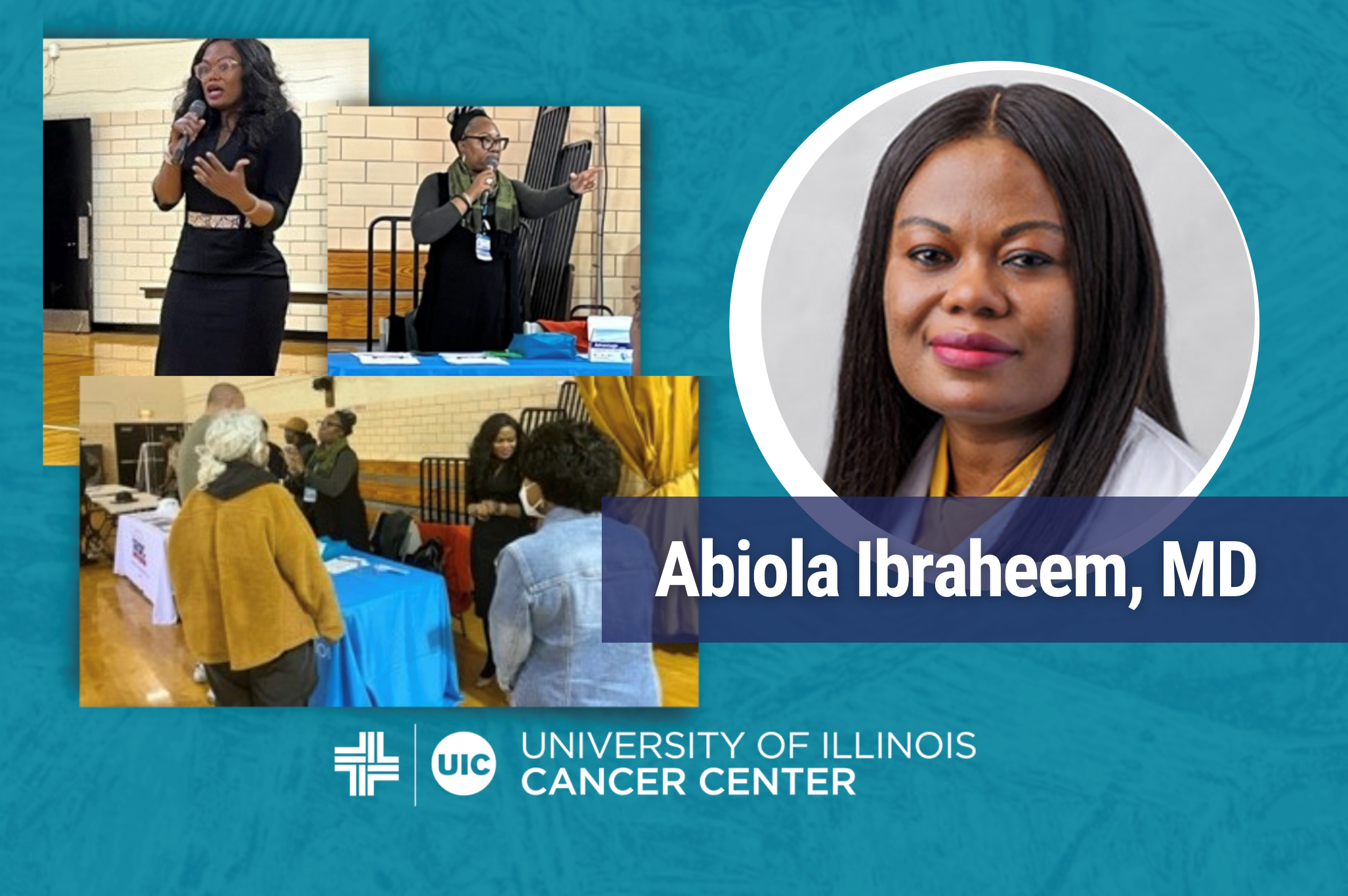
Abiola Ibraheem, MD, one of the newest members of the University of Illinois Cancer Center, is working to understand the breast cancer tumor biology of Black women and improving diversity in cancer research conducted in the United States and in her home country of Nigeria, one of the largest countries in Africa.
Improving Breast Cancer Treatment and Outcomes For Black Women Through Screenings and Clinical Trials
Recently, Ibraheem took part in a town hall event at the Chicago Park District’s Avalon Park on the city’s South Side where she talked about Black women and breast cancer, a disease black women are more likely to die from than white women. Ibraheem encouraged attendees to get breast cancer screenings and to participate in clinical trials to improve diversity in cancer research when she spoke at the October event put on by Illinois State Rep. Marcus C. Evans Jr.
(Photos from the event are included in the image above and they feature (left to right) Ibraheem and Mona Strahan, MPH, a research specialist in the Cancer Center’s Office of Community Engagement and Health Equity.)
Ibraheem also joined Evans at another town hall in the south suburban community of Calumet City to talk to more women about breast cancer and cancer research.
Calling to Improve Breast Cancer Research
“My career path chose me,” said Ibraheem, who serves as liaison to the American Society of Clinical Oncologist’s (ASCO) newly formed Sub-Saharan Africa Regional Council. “As a Black woman originally from Nigeria, I can relate with the inequities that patients who look like me face in the health care system. For the past decade, I have worked tirelessly toward my ultimate career goal of improving the outcome of Black women suffering from breast cancer.”
Upon graduating medical school from Nigeria’s Olabisi Onabanjo University, Ibraheem practiced in Lagos State Nigeria for five years. She witnessed how the country’s poor health care system slowly responded to patients with early stage cancers who could not afford to travel abroad for cancer treatment.
“My helplessness, intense anger and the willingness to do more propelled my interest in an oncology career,” said Ibraheem, part of the Cancer Center’s Cancer Prevention and Control research program. “Having lost many friends and relatives to cancer prematurely, I had only one goal for my career as a physician: to return to the United States, become a medical oncologist and return to Nigeria to improve the outcomes of cancer patients in my native country.”
Addressing Health Care Disparities Through Research
During a residency program in internal medicine at the Morehouse School of Medicine in Atlanta, Ibraheem made diversity in cancer research a priority by conducting research on racial health care disparities across hematological malignancies in the area. She has completed electives at three different Cancer Centers of Excellence: Emory and Vanderbilt universities, and the National Cancer Institute, and she has taken a National Institutes of Health course about clinical research. A hematology/oncology fellowship at the University of Chicago followed.
Using the National Cancer database, Ibraheem has conducted multiple retrospective studies describing the aggressive tumor biology of Black women with breast cancer. Her work garnered Ibraheem an AACR Breast Cancer Scholar in Training Award.
Future of Ibraheem’s Breast Cancer Research
Ibraheem, whose work has been published in several high impact journals, recently received the Robert A. Winn Diversity in Clinical Trials Career Development Award, as did Ryan Nguyen, DO, another University of Illinois Cancer Center member. The two-year award recognizes “outstanding professional achievements and promise as a community-oriented clinical researcher” and is sponsored by the Bristol Myers Squibb Foundation, Gilead Sciences and the Massey Cancer Center at Virginia Commonwealth University.
Ibraheem will examine the effect of low dose Azacitidine on tumor infiltrating lymphocytes in Black women with early-stage, high risk HR+ breast cancer, and identify the barriers and facilitators to enrolling underrepresented minority patients (particularly Black women) in invasive biomarker-driven clinical trials.
